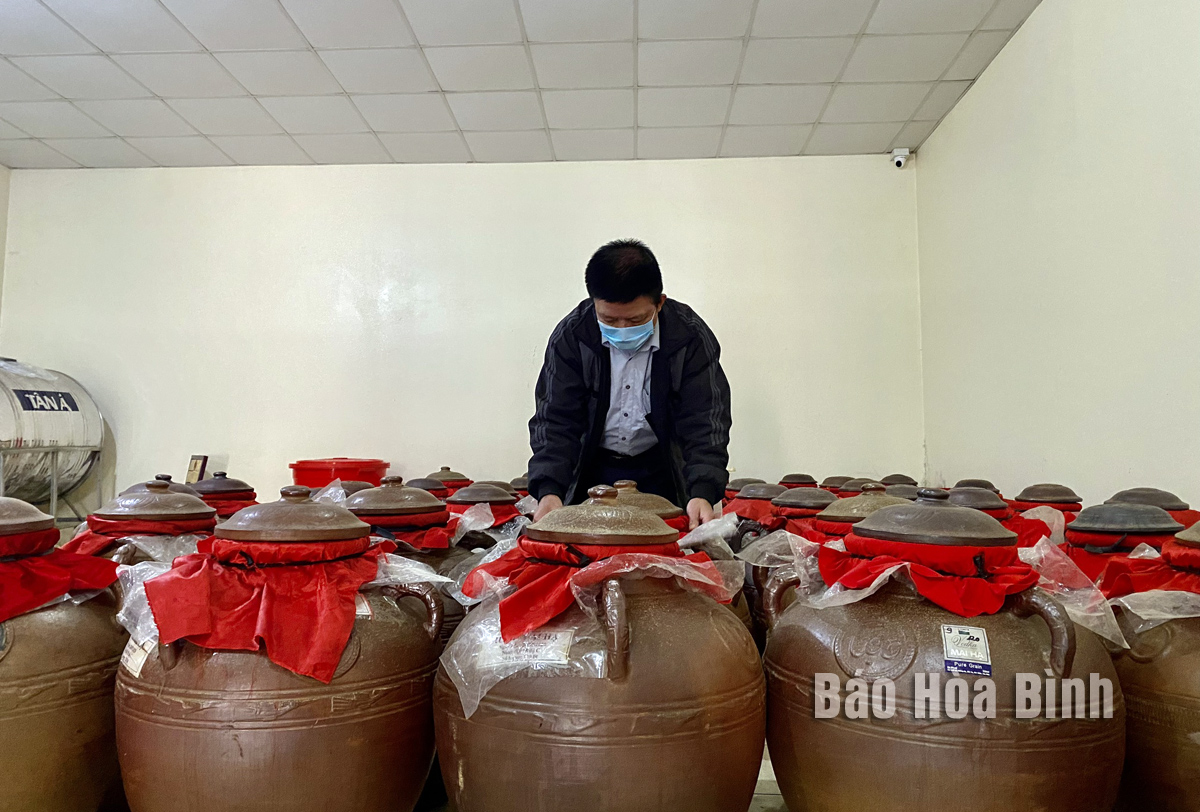
Hoa Binh province is home to 11 recognised traditional craft villages which have played a crucial role in increasing income, improving living conditions, and driving economic growth in rural areas.
Residents of Mai Ha alcohol village (Mai Ha commune, Mai Chau district) examine product quality before distribution.
Among these, Mai Ha alcohol village in Mai Ha commune, Mai Chau district, stands out as a model of cultural preservation combined with economic growth. Mai Ha alcohol is not only a distinctive local beverage but also a source of pride for the community.
Mai Ha alcohol stands out for its traditional distillation, using natural underground water and a unique herbal fermentation starter made from over a dozen forest plants. This process, refined over generations, produces a crystal-clear liquor with a smooth taste and lingering sweetness.
More than 200 households in the village produce thousands of litres of alcohol annually, gaining nationwide recognition. The brand has earned a three-star rating under the national One Commune One Product (OCOP) programme, boosting its market value and distribution.
Beyond providing stable income, alcohol production preserves a cultural heritage passed down through generations. The village has become a tourist attraction, drawing visitors eager to witness the process and sample the famed liquor.
According to the provincial Sub-Department of Rural Development, Hoa Binh has 11 recognised craft villages. Two of them, including Mai Ha, specialise in alcohol production, while others focus on woodwork, bamboo weaving, ceramics, and brocade textiles. These industries sustain traditional values while generating income for rural communities.
The province’s craft villages employ around 1,300 workers, with monthly wages ranging from 3 to 5 million VND. Many have developed OCOP-certified products, enhancing market appeal.
Despite their contributions, challenges persist such as unstable raw material supplies, market competition, a lack of skilled successors, and outdated production techniques. Despite the government's support policies, access to loans and trade promotion remain limited.
Hoang Van Tuan, Deputy Director of the Sub-Department of Rural Development, reaffirmed the province’s commitment to training programmes, business networking, and product promotion. Authorities are also strengthening quality control and embracing digital transformation, registering products for traceability and showcasing them on e-commerce platforms to expand markets.
These combined efforts are driving Hoa Binh’s craft villages forward, contributing to the rural areas' development.
In Lac Thuy district, communes have been succeeded in promoting their One Commune-One Product (OCOP) products while others are still struggling to position their typical farming products in market. Some communes in the district still fail to have their products met OCOP programme’s requirements, while others have seen their certifications expired.
The inspectorate agency of Hoa Binh province has issued Official Dispatch No. 1090/TTr-PCTN to provincial departments, agencies, localities, business associations, enterprises, and investors regarding measures to improve informal component indexes of the Provincial Competitiveness Index (PCI).
Hoa Binh is taking concrete steps to improve its investment environment, with a strong focus on supporting businesses, settling obstacles for strategic investors, and creating opportunities for robust development in the coming years.
Under the blazing early summer sun, the construction site of Nhuan Trach Industrial Park (IP) in Luong Son district is abuzz with activities from dawn to dusk, a testament to the determination of the investor to meet their construction targets on schedule.



